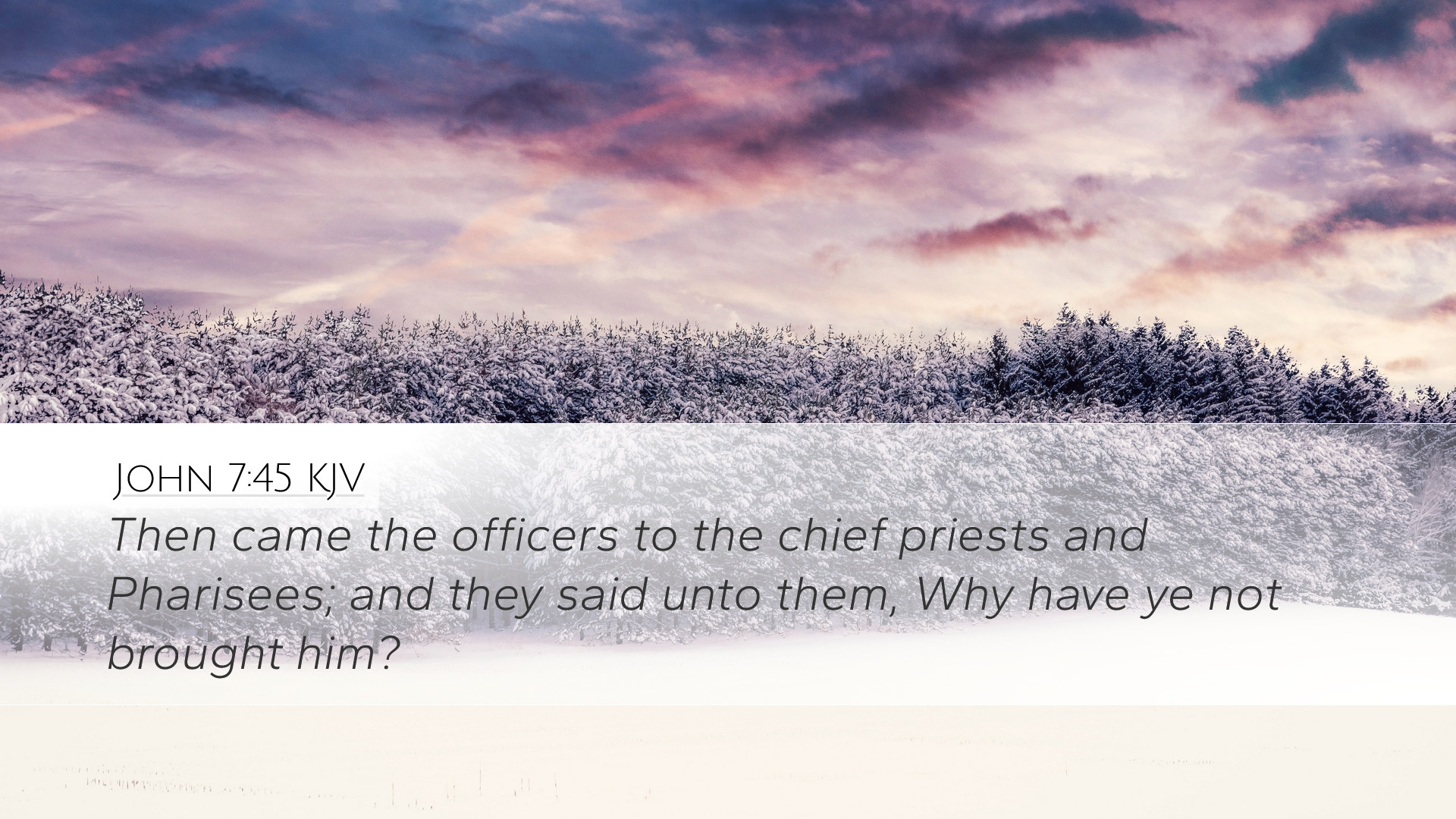Commentary on John 7:45
John 7:45 states, "Then came the officers to the chief priests and Pharisees; and they said unto them, Why have ye not brought him?" This verse marks a pivotal moment in the Gospel of John, encapsulating the tension and conflict surrounding Jesus’ ministry.
Context and Significance
The context of this verse is essential for understanding its significance. Jesus had been teaching in the Temple, evoking varied reactions from the multitudes and the religious authorities. It is important to note that the Temple was a place steeped in religious authority and expectation, making Jesus’ presence there particularly controversial.
Insights from Public Domain Commentaries
Matthew Henry's Commentary
Matthew Henry emphasizes the amazement of the chief priests and Pharisees at the officers returning without Jesus. He notes that the officers were sent to arrest Jesus but instead were captivated by His teachings. Henry highlights the apparent power of Jesus' words, which caused the officers to reconsider their mission.
- Human Influence: Henry suggests that the officers' failure to fulfill their orders illustrates how human agency can be influenced by divine authority. This incident serves as a reminder that earthly command can be transcended by spiritual truth.
- Call to Genuine Inquiry: Henry encourages readers to reflect on their own inquiries into Christ. When faced with the truth of the Gospel, like the officers, they might find themselves captivated rather than critical.
Albert Barnes' Notes on the New Testament
Albert Barnes comments on the implications of the officers' actions and the response from the religious leaders. Barnes highlights that the officers, instead of obeying their orders, returned discussing how they had never heard a man speak like Jesus.
- Witness to Authority: Barnes points out that the officers' return is significant. They serve as unintentional witnesses to Jesus’ authority, showing that exposure to Christ cannot leave one unchanged.
- Religious Fear: He also notes the fear and frustration of the Pharisees, emphasizing their reliance on tradition and legalism. His analysis includes the idea that these leaders were threatened by the authority of Christ, which contrasts with their own.
Adam Clarke's Commentary
Adam Clarke provides a detailed exploration of this verse, focusing on the implications of the officers' failure to apprehend Jesus. Clarke reflects on the role of the officers, servants of the Pharisees, who are drawn to the truth yet remain entangled in the political and religious machinations of their leaders.
- Divine Intervention: Clarke emphasizes that the officers were likely prevented from arresting Jesus by divine influence. This speaks to the sovereignty of God, showing that His purpose cannot be thwarted by human attempts to suppress it.
- Reflection of Hearts: He also discusses how the response of the officers reflects a deeper yearning for truth among the people, contrasting sharply with the hardness of the hearts of the religious leaders.
Theological Implications
The theological implications of John 7:45 are profound and multi-faceted:
- The Nature of Authority: The verse illustrates the contrast between human authority and divine authority. The officers, representing human authority, find themselves in the presence of a much greater power that compels them to question their orders.
- Transformation through Encounter: The officers' experience emphasizes the transformative power of an encounter with Christ. Instead of executing orders, they are left to ponder His teachings, pointing to the life-changing impact Christ has on those who truly listen.
- Opposition to Truth: The response from the chief priests and Pharisees signifies the ongoing opposition to the truth of the Gospel. It serves as a timeless reminder of how religious establishments can resist transformative truth when it threatens their power.
- The Role of Witnesses: This passage calls believers to be witnesses of Christ’s truth. Just as the officers became reluctant witnesses, Christians today are tasked with sharing what they have experienced and learned from Jesus.
Practical Applications
For pastors, theologians, and students, John 7:45 provides several practical applications:
- Encouragement for Authentic Ministry: This passage encourages ministers to rely on the authority of Christ in their teaching and preaching. Authentic ministry may compel the audience to a genuine encounter with Jesus.
- Understanding Resistance: It helps to understand that resistance to the truth of the Gospel is not a new phenomenon. Scholars and pastors can better prepare to address similar challenges in their communities.
- Promoting Inquiry: This verse serves as a call to foster an environment of inquiry and openness, encouraging individuals to ask questions about their faith and explore the teachings of Christ.
In conclusion, John 7:45 stands as a rich text that exposes the complexity of human responses to the divine. It challenges believers to reflect on their own hearts and the ways in which they engage with the truth of the Gospel, serving as a timeless reminder of the tension between authority and authenticity.


